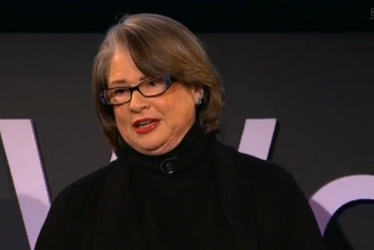And all things being equal, older people direct their cognitive resources,
在同等條件下,老年人會將自己的認知資源,
like attention and memory, to positive information more than negative.
比如注意力和記憶力,更多地導向積極信息,而不是消極信息。
If we show older, middle-aged, younger people images, like the ones you see on the screen,
我們向老年組、中年組和青年組展示圖像,正如你們在屏幕上看到的,
and we later ask them to recall all the images that they can,
過后我們讓他們回憶他們看到的圖像,
older people, but not younger people, remember more positive images than negative images.
老年組,而非青年組,記得的積極圖像多過消極圖像。
We've asked older and younger people to view faces in laboratory studies, some frowning, some smiling.
我們讓老年組和青年組去看實驗室研究所用的臉部表情,一些皺眉、一些微笑。
Older people look toward the smiling faces and away from the frowning, angry faces.
老年組看向微笑的臉,而回避皺眉的、憤怒的臉。
In day-to-day life, this translates into greater enjoyment and satisfaction.
在日常生活中,這轉換成更大的樂趣以及滿足。

But as social scientists, we continue to ask about possible alternatives.
但作為社會學家,我們繼續問是否有其他可能。
We've said, well, maybe older people report more positive emotions because they're cognitively impaired.
也許老年人報告更多的積極感受是因為他們認知機能受損。
We've said, could it be that positive emotions are simply easier to process than negative emotions,
會不會積極情緒比消極情緒更易處理,
and so you switch to the positive emotions?
所以他們更傾向于積極情緒?
Maybe our neural centers in our brain are degraded such that we're unable to process negative emotions anymore.
也許我們腦內的神經系統退化了,以致無法處理消極情緒。
But that's not the case. The most mentally sharp older adults are the ones who show this positivity effect the most.
但事實并非如此。老年組里思維最敏捷的,恰恰是最積極的。
And under conditions where it really matters, older people do process the negative information just as well as the positive information.
在關鍵時刻老年人處理消極情緒和處理積極情緒的能力是一樣的。











